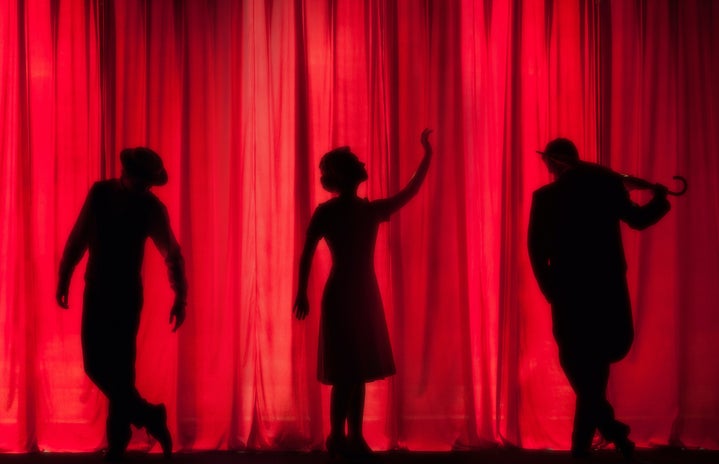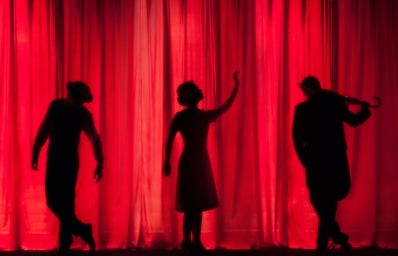This week I was delighted to watch one of the musicals which holds a dear place in my heart, Jason Robert Brown’s ‘The Last Five Years’, put on by the Musical Theatre Society at the Pyramid Theatre. Directed by Her Campus’ very own Anna Duffell and Charlotte Hunter, produced by Brad Freeman and with Alex Boulton as Musical Director, this show is one which has been very lovingly crafted by all involved, contrasting the acrimony which tinges most divorces. This show already follows an unconventional mode of storytelling with Jamie telling his story chronologically whilst Cathy’s is in reverse. Adding on to this unconventional narrative, neither of the two characters directly interact with one another asides from the beautiful wedding duet at the show’s middle and the heart-breaking juxtaposing final number. Despite this challenging form, Duffell has, rather wonderfully, ingeniously, (and to future directors: ‘about bloody time’), brought a new depth to the musical in the debut double casting of a heterosexual and lesbian relationship. The musical follows the fluctuating moments of love interspersed with gaslighting, tears, temptation, neglect, and insecurity in the five-year relationship between Jamie Wellerstein, the successful, career-driven novelist, and Cathy Hiatt, the aspiring, but struggling, actress who yearns to be loved, culminating in the irreconcilable separation of the two at the end of their twenties.
The combination of the minimalistic set design, the string quintet in full display with pianist Alex Boulton in the centre stage (who deserves a shout out as playing whilst being disrupted by the actors is no easy feat), and the ‘in the round’ staging created a laid back, intimate atmosphere which allowed for the power of the lyrics – words which cut deep – and the vocal talent to fully shine. And what a talent they all are. Staging the show ‘in the round’ was the ideal choice as the intimacy invites us to judge, or even just observe what feels like, although undoubtedly unhealthy, a rather normal relationship in the sense that these are likely arguments we have experienced word for word ourselves, or insecurities which have triggered our own breakups, enabling us to project and reflect. The debuting of a queer couple was a stylistic choice I adored, as for me personally it shifted the rigid binaries I have always – maybe at times unfairly – conceptualised between who was in the right and wrong between Jamie and Cathy. Duffell perfectly highlighted this nuance and normalcy in the long-term relationships in our formative years, leaving me with new emotions and reflections on my own past relationships. By moving away from the confines of heteronormativity, the commentary on the power dynamics which come with gender – for example Jamie being exposed to a position of power over the young women who ask for him to look over their manuscript, or Cathy’s realisation that herself and the women around her have lost their identity to their male partners – becomes all the more interesting and illustrative in this reversal. The normalcy Duffell highlights is at its clearest in this queer retelling because the problems in their marriage aren’t entirely gender specific, helping to move away from this reductionist notion of who is responsible, and therefore allowing nuance to take centre stage in this universal tale of the ‘winning’ and ‘losing’ in the loss of a relationship. Moreover, in the blossoming of queer representation in the media, the smooth, angelic harmonies in this arrangement of the wedding duet was a personal highlight having only seen the roles performed by a man and woman. I now desperately wish each future performance of ‘The Last Five Years’ have this beautiful version performed by Freya MacTavish and Rowan Macpherson.
‘The Last Five Years’ is deceptively tricky to successfully pull off for the actor: how can you portray the gradual wearing down, the poison that is resentment into the naïve optimism or the hopeful imagining of a lifetime of memories to come, without being able to react to the other? Kicking off with Cathy’s song ‘Still Hurting’, I’m always bewildered how Brown thought we would ever be able to ‘side’ with his narrative, when both Ella Smith and Freya MacTavish in just five minutes so effortlessly and compellingly drew the audience into five years’ worth of a woman’s hurt, overshadowed by a partner who chose success over love, with their gorgeously rich voices. With the spotlight shining down on a broken woman signing her divorce papers alone at a table, the transition to the bright, beaming fresh-faced 23-year-old who eagerly awaits her next date with Jamie and asserts that she can do better than the hometown she left behind at the play’s end was beyond impressive from both Smith and MacTavish. I adored the subtlety of ‘A Part of That’ in which both Smith and MacTavish were able to capture the denial and bargaining that Cathy is trapped in and the sad realisation that she is not, in fact, a part of that in the heart-breaking quivering of the voice on ‘aren’t I?’. However, my personal highlights were the comedic relief of ‘Summer in Ohio’ and ‘Climbing Uphill’. Both songs are certainly immersed in sadness as it is clear that the resentment is building as Cathy becomes determined not to be the one left behind “trotting along the genius’s heels”, but it was a breath of fresh air for an audience who had primarily seen the charming energy of Jamie at full display to see both actresses be able to have fun with the audience and frantically dance around the stage. It was interesting seeing the differences in the portrayal of Cathy depending on the gender of Jamie. When Smith sang ‘When You Come Home to Me’ in this unhinged manner directly to Jamie the powerful anger in ‘Still Hurting’ returned and I felt transfixed watching her stand up for herself, reclaiming the determination and promise she made to herself in ‘I Can Do Better Than That’ which illustrated the commentary of this resentment, to some extent, being a gendered issue as she is continually judged on her appearance as an actress. Meanwhile, Jamie surrounds himself with women in his newfound fame where only the content of his writing is judged. In MacTavish’s portrayal there felt like a longer patience to following Jamie as both are aware of how much harder it is for a woman’s talents to be recognised, creating an introspective, reflective nature for Cathy who is conflicted over revealing her feelings of alienation.
If you were just to read the lyrics alone it would be difficult to find much empathy for Jamie, and so the character must be played in such a way that illustrates the charm that makes Cathy and the publishing world fall in love with him. Ajay Sahota and Rowan Macpherson nailed the charisma and giddy excitement in Jamie’s introduction. ‘The Schmuel Song’ is undoubtedly the song in which the audience fall in love with Jamie and I imagine was the most demanding in its use of props. Plenty of opportunity to trip over string lights, a highlight was the difficulty of wrapping these lights around the mannequin and even when the lights didn’t always cooperate, the self-assurance of Jamie was at its peak in both actors’ ability to play with the audience and make it appear part of the routine. When I looked around me, the audience were beaming as we saw Jamie’s genuine love for Cathy in the early days in the silly voices and theatrics, and it brought a beautiful and humorous juxtaposition to the heartbreak so wonderfully portrayed by Smith and MacTavish. When the shift in ‘If I Didn’t Believe in You’ arose, the deliverance was breath-taking. A true testament to Macpherson, it was the first time hearing the song where I understood Jamie’s frustration at feeling unsupported or condemned by Cathy for the newfound success. The harsh words, “I will not fail so you can be comfortable Cathy, I will not lose because you can’t win”, were delivered in a way that felt like she was pleading, reaching out the olive branch to an unforgiving partner and worn down by the need to suppress her own achievement, something she has always wanted, because Cathy has yet to do the same. Yes, Jamie is the one who resorts to the most unforgiveable of actions, but this pleading through the eyes of a woman challenged the mindset that Jamie is entirely responsible as a woman at her last tether, drained by her wife’s negativity stands before us. In contrast, in Sahota’s portrayal of the breaking point in Jamie’s light-heartedness and continued support as he screams at Cathy, created this tension where you could hear a pin drop, enabling an uneasy reflection on his previous song, ‘A Miracle Would Happen’ as it becomes clear that the cracks are opening up for Jamie to justify seeking solace elsewhere, leaving me on the edge of my seat watching the illusion come crashing down. The gasps and stillness were a marvellous juxtaposition to the laughs Sahota had raised from the audience in the cheekiness of ‘Shiksa Goddess’ and such a fantastic display of range as you could almost take on Cathy’s feelings of betrayal as we no longer recognised the charismatic, romantic storyteller from before.
Only coming together for two songs, it was clear why the pairings were chosen together in their chemistry. Each actor had done such a great job in acting as though there was someone always present in their songs, that I forgot the absence until the middle wedding duet which was a heart-warming sight to behold in the momentary pause in anger or heartache as the two could act off each other’s energy. Juxtaposed with the final duet as we see that the relationship is beyond saving as each arc has been completed, it was a tender moment of happiness wrapped up in gorgeous vocal harmonies and a loving embrace allowing us to be blissfully unaware just for a few minutes.
Although part of Musical Theatre Society’s ‘small show’, ‘The Last Five Years’ was a performance with big reverberations in its hauntingly beautiful vocal displays and the deep resonance of heartache and loss.
Written by: Amelia Craik
Edited by: Chloe Hill


